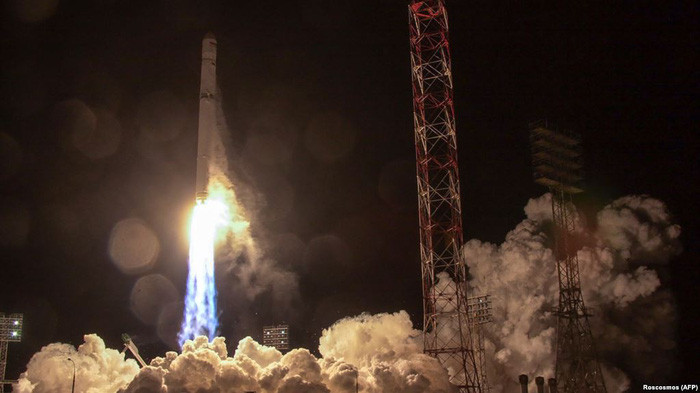Russia lost contact with the satellite launched to foreign countries
Two consecutive incidents of losing contact with satellites within 2 months caused public opinion to ask what was the cause and was answered by Russian Deputy Prime Minister on December 27: due to human error!
Energia, Russia's leading manufacturer of spacecraft, said on December 27 that it lost contact with Angosat-1, Angola's first country.
Energia, the Angosat-1 producer, said that shortly after leaving the launch pad on the same day, the satellite went into a predetermined orbit and set up communications as planned. However, the satellite then stopped transmitting the measured data.
Energia's experts are analyzing the data collected and attempts to restore contact. Angola said it was too early to comment on the incident.

Zenit-2SB boosters carrying Angosat-1 satellites leave the launch pad on December 27 from Baikonur Space Center in Kazakhstan - (Photo: AFP).
According to Energia, similar incidents have happened to satellites of some countries, including the US and Kazakhstan. In 2006, the US Aeronautics Agency (NASA) successfully restored a satellite connection after nearly two years of losing contact.
The rocket that Russia used in this launch is Zenit-2SB provided by Ukraine, marking a rare joint project that the two countries have jointly implemented since the tensions erupted after Russia's merger. 2014 Crimean peninsula.
The satellite launch project has been signed by Russia and Angola since 2009 with a value of nearly $ 280 million, funded by Russian state banks. As planned, the launch was carried out last summer but was delayed due to a number of technical reasons.
In November, Meteor-M, a weather satellite, lost contact with the ground after being launched from Vostochny launch ground in Russia's far eastern region. The 18 smaller satellites of scientific, research and commercial companies from Russia, Norway, Sweden, the United States, Japan, Canada and Germany all have the same boosters with Meteor-M.
The launch of the satellite costs 2.6 billion rubles (about 45 million USD) so it is considered a failure.
Responding to the 24th Rossiya TV channel on December 27, Russian Deputy Prime Minister Dmitry Rogozin confirmed human error was the cause, apparently due to programmers' habits.
According to Rogozin, the rocket has been programmed as if it is taking off from Baikonur - a space facility leased by Russia in Kazakhstan, ie the actual launch site is Vostochny thousands of kilometers!
Baikonur was the location where Russia launched satellite to Angola on December 27 and lost contact later as stated above. Compared to Baikonur, Vostochny is "rookie" , considered the first civilian launcher of Russian space, was put into operation last year.
During its 15-year operation, Angola's satellite is responsible for enhancing satellite connectivity, access to the Internet, radio and television services for the country. More than 50 Angolan cosmologists trained in countries around the world including Brazil, China, Japan and Russia will monitor the satellite's operation from the control center near Luanda.- Russia lost contact with the satellite because of a cable break due to road repair
- If a 'million dollar' satellite suddenly disappears, what will NASA do?
- Russia launched a satellite to spy
- Russia successfully launched a military satellite
- Russia launched into three new satellites orbits
- Russia launched Glonass maritime satellite
- Russian spacecraft lost contact for several hours
- America launched a new military satellite
- Russia launched American satellites into orbit
- Russia restored contact with Angola's Angosat-1 satellite
- Russia put the strongest communication satellite into orbit with Proton-M missiles
- Russia launched its first private satellite in 2013
 Van Allen's belt and evidence that the Apollo 11 mission to the Moon was myth
Van Allen's belt and evidence that the Apollo 11 mission to the Moon was myth The levels of civilization in the universe (Kardashev scale)
The levels of civilization in the universe (Kardashev scale) Today Mars, the sun and the Earth are aligned
Today Mars, the sun and the Earth are aligned The Amazon owner announced a secret plan to build a space base for thousands of people
The Amazon owner announced a secret plan to build a space base for thousands of people